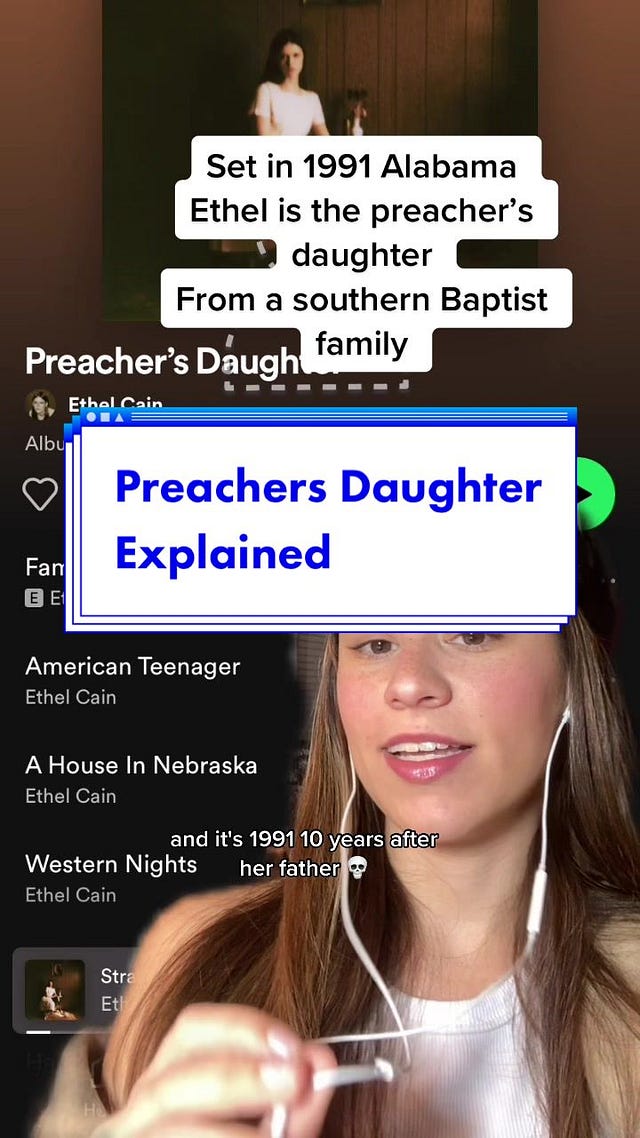Dissecting Ethel Cain's "Preacher's Daughter"
Making it more digestible, if you will
In all seriousness, this is a phenomenal, beautifully devastating concept album.
Maybe you’ve seen chatter amongst the indie music side of TikTok, brief mentions of “Preacher’s Daughter” floating the Internet, and, upon hearing these out-of-context details, thought to yourself: ”Wait…what?”
“Preacher’s Daughter” is a 13-track, 76-minute long, folk-rock-blues Southern Gothic opera, following a fictional character, the preacher’s daughter, who loses lover after lover and grapples with religious trauma and sexuality in her Alabama hometown, before being kidnapped and sold into prostitution. After attempting to escape, her captor kills and cannibalizes her.
Yes, she gets eaten.

 Tiktok failed to load.
Tiktok failed to load.Enable 3rd party cookies or use another browser
In order to really appreciate the album on first listen, I believe it’s necessary to have an understanding of the plot. I’m going to attempt a track-by-track plot summary here, but I also recommend this Twitter thread below that Ethel Cain (real name Hayden Anhedönia) actually re-Tweeted:
Track-by-track rundown:
Family Tree (Intro)
American Teenager
Here, we get all the background. These songs are suggestive of a strict religious upbringing, abuse, and generational trauma all set in a patriotic southern town. It’s 1991 in the fictional Shady Grove, Alabama, 10 years after the death of Ethel’s father, the town preacher. In “American Teenager,” she starts to notice the darkness in her surroundings, particularly after the neighbor’s brother dies in the military.
A House in Nebraska
Ethel is reminiscing about her first love, Willoughby Tucker, who left town before the album starts.
Western Nights
Family Tree
Hard Times
In “Western Nights,” Ethel has found a new lover, Logan, a Harley-driving, trouble-causing, overall shady character. He’s killed in a police shootout during a bank robbery.
“Family Tree” and “Hard Times” revisit the family trauma, particularly confronting the sexual abuse Ethel endured from her father. Ethel runs away from home.
Thoroughfare
Wandering along the side of the highway, after running away from home, Ethel meets Isaiah, who offers her a ride from Texas to California. The two start to form a relationship.
Gibson Girl
As soon as they get to California, Isaiah begins selling Ethel into prostitution, and feeds her drugs.
Ptolemaea
Ethel, under the influence of drugs, starts to feel the full torment of her abuse and darkness.
August Underground
Ethel tries to escape from Isaiah but he catches her in the woods and murders her.
Televangism
Sun Bleached Flies
Ethel ascends into Heaven and makes peace with her past, her family and lovers, including Willoughby, whom she never stopped loving.
Strangers
Ethel wishes her mother goodbye, but also addresses Isaiah— “If I’m turning in your stomach and I’m making you feel sick,” she sings.
Anyways, Follow For More
Insta: @sarah.alessandrini • TikTok: @sarahalessa_ • Spotify: @saraha724
Wait, how do we know all this?
Anhedönia has explained the plot in interviews with Them, Billboard, and others, and teased the characters in promotional material and art for the album on her socials, including Tumblr, Instagram, and Twitter.
Born in Florida, Anhedönia’s experience of growing up queer and coming out as trans to her Southern Baptist family inspired the album.
If you’re a fan of Ethel Cain, check out this playlist:
So, she gets eaten…Why?
It’s really difficult to simplify such an intricate, well-crafted album. But ultimately, the reference to Ethel’s gruesome fate is a metaphor: Here’s what happens when you don’t unpack your generational trauma, forgive, or heal. This is what happens when you don’t set yourself free.
“Overall, it’s definitely a cautionary tale of what happens if you don’t break a cycle and you let it continue to almost a ruinous point. It’s what I see as a dark timeline of what would happen if everything hit its lowest point,” Anhedönia told Alternative Press.
Anhedönia told Billboard that Ethel Cain represents what would have happened if she did not choose to leave her old life behind—“If I didn’t choose to heal and forgive and forget, I would be ultimately destroyed, which is what happens to her. She is the mirrored version of what my life would be like if I chose not to get better,” she said in the article.
“It’s a cautionary tale of what happens if you don’t break a cycle….It’s what I see as a dark timeline of what would happen if everything hit its lowest point”
Hayden Anhedönia (Ethel Cain) in Alternative Press
While the songs range in genre, some sounding more pop-like and others more folk, it ultimately falls into the a dark Americana, Lana Del Rey-esque category. But really, there isn’t much you can compare this album too. At all.
She told Alternative Press that this album is actually the first of a trilogy, and while Ethel’s story has come to an untimely end, she’ll be taking us back up the Cain family tree, so each album will center around different woman. She also hopes to make a film for each album as well, she told AP.
Religious trauma seems to be a big theme in music today. I might do more on that later, though.
Read More
The Favors, Rachel Chinouriri, Laufey: What I'm listening to in September
Hey all! It’s been a minute.










While I do think religious trauma does play a large part in the cinematic universe of ethel cain, I think it'd be best to give credits to the actual focus of the trilogy, the complex relationship between the generations of women.
I always found the lyrics in "family tree (intro)" to highlight that the most, along with ethel's words to her mother in "strangers". One of the best themes, that is hardly done in this light!